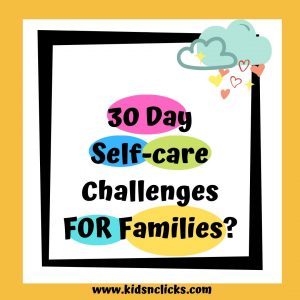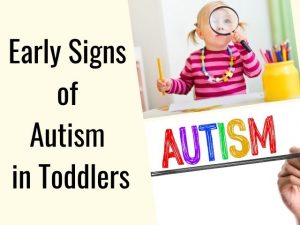According to the American Academy of Pediatrics (AAP) suggests that children between the age of 2-3 years old should not be exposed to any screen time. Children between 2-5 years old should be limited to one hour a day. In this article, I will share with your offline and online cognitive activities for 3- 5 years old.
Although the recommendations from the experts suggest one hour of screen a time a day, I believe in quality screen time rather than quantity of it.
I have certain apps that my child enjoys and we get to learn and play together.
While introducing screen time to my child, I still do not leave her alone with the device. She is still young for me to do that. I also encourage lots of outdoor play.
Now, lets explore different cognitive activities for 3-5 years old, offline and online.
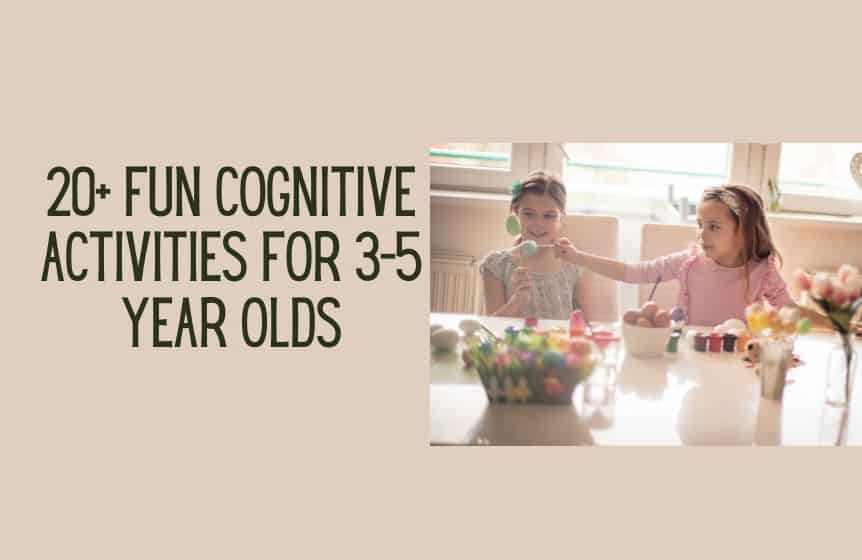
Cognitive development activities for preschoolers:
- Puzzle Time: Simple jigsaw puzzles help improve problem-solving skills and hand-eye coordination.
- Storytelling Sessions: Reading stories together enhances language skills and imagination.
- Shape and Color Sorting: Sorting games with different shapes and colors boost categorization skills and visual discrimination.
- Memory Games: Play matching games to improve memory and concentration.
- Building Blocks: Using blocks to build structures encourages creativity and spatial awareness.
- Counting Games: Use everyday objects to count and recognize numbers, promoting early math skills.
- Role-Playing: Pretend play, like playing house or store, helps with social skills and understanding different perspectives.
- Nature Walks: Explore the outdoors and talk about what you see to enhance observation and vocabulary.
- Arts and Crafts: Drawing, painting, and crafting stimulate creativity and fine motor skills.
- Music and Movement: Singing songs and dancing to music supports memory, rhythm, and coordination.
Outdoor Cognitive Activities for 3-5 Years Old
- Scavenger Hunt: Make a list of nature-related items and give your child the mission to find them in the garden. It’s a fantastic way to hone their problem-solving skills. Feel free to use the file below for your next hunt.
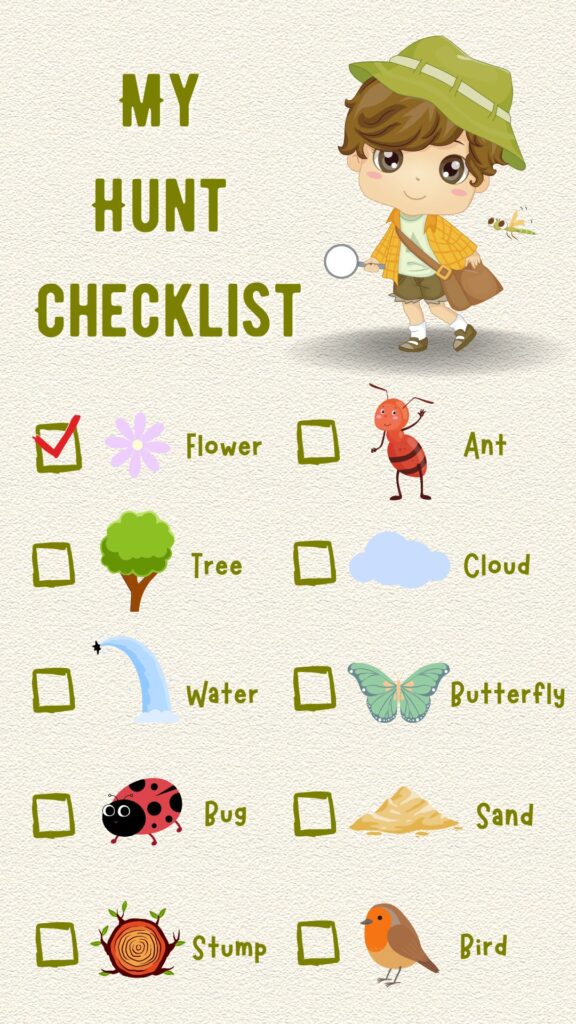
- I Spy Nature: This classic game of ‘I spy’ with a natural twist can help children recognize different shapes, colors, and textures in the environment.
- Cloud Stories: Lie down in your backyard and engage in creating stories about cloud shapes. This encourages imagination and language skills.
- Obstacle Course: Design an exciting course with slides, hoops, and barriers. Your backyard can turn into a problem-solving playground!
- Outdoor Alphabet Hunt: Hide alphabet cards around the garden. This fun game combines physical activity with letter recognition.
- Sidewalk Chalk Art: Unleash their creativity with chalk. They can practice writing, draw, or play games like hopscotch.
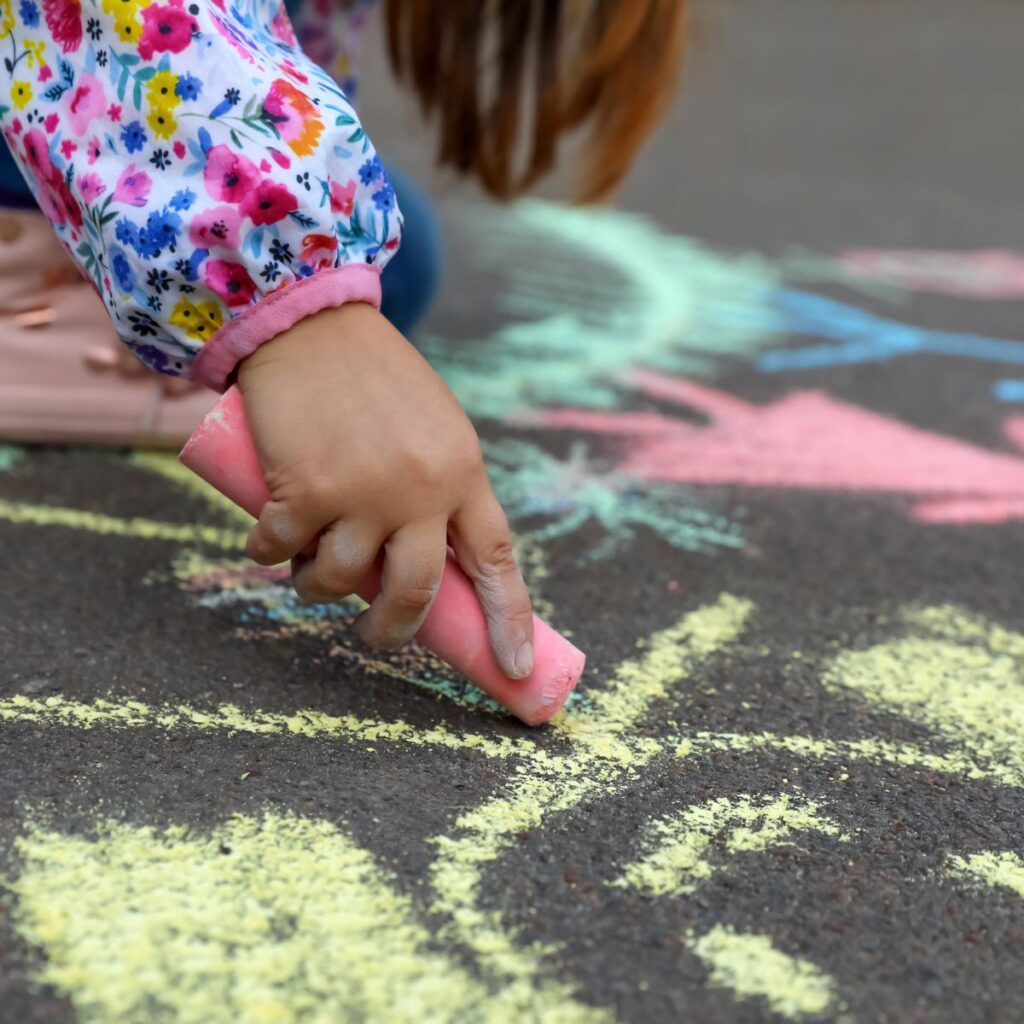
- Nature Sort: Collect leaves, stones, flowers, and sort them based on size, color, or type. This activity enhances categorization skills.
- Water Play: Using different containers and tools, let them explore how water flows, spills, and fills. This is a simple way to teach physics.
- Gardening: Let your child help in planting seeds and watering plants. This teaches them about nature’s life cycles.
- Shadow Drawing: On a sunny day, let them draw the shadows of toys or plants. This can stimulate their cognitive function in different ways.
- Music with Nature: Use sticks, stones, and leaves to create sounds. This creative play fosters auditory learning.
- Outdoor Pretend Play: Encourage them to enact stories, play house or have a pretend picnic with friends. This helps in building social skills.
- Bug Exploration: With supervision, exploring and learning about insects can be fun. This will help improve their understanding of the ecosystem.
- Play Catch: Throwing and catching a ball improves motor skills and hand-eye coordination.
- Visit Local Children’s Museum: Museums provide an array of sensory experiences, enhancing cognitive growth.
Indoor Cognitive Activities for toddlers
- Puzzles: Simple puzzles are great for problem-solving and critical thinking. Try puzzles with big pieces initially and gradually increase complexity.
- Card Games: Games like ‘Go Fish‘ or ‘Old Maid’ are excellent for number recognition and memory. This is definitely our favorite game.
- Building with Blocks: Stacking wooden blocks can teach balance, gravity, and spatial awareness. We do lots of Jenga blocks at home, especially during the winter months.
- Imaginative Play: Whether it’s a kitchen set or a doctor’s kit, pretend play stimulates creativity and empathy.
Join our Eparenting group on Facebook for more safety tips

- Coloring: A simple and fun way to improve fine motor skills and color recognition.
- Board Games: Simple board games can teach rules, turn-taking, and counting.
- Story Time: Regular story sessions can significantly enhance language skills and creativity.
- Rhythm and Dance: Dancing to favorite songs is a joyful way to improve physical coordination.
- Hide and Seek: An all-time favorite that helps kids understand the concept of object permanence.
- Cooking/Baking: With supervision, this activity can teach measurement, cause-effect, and patience.
- Shape Hunt: Hunt for different shapes around the house. This enhances their ability to identify shapes.
- Origami: Simple paper folding can improve fine motor skills and patience.
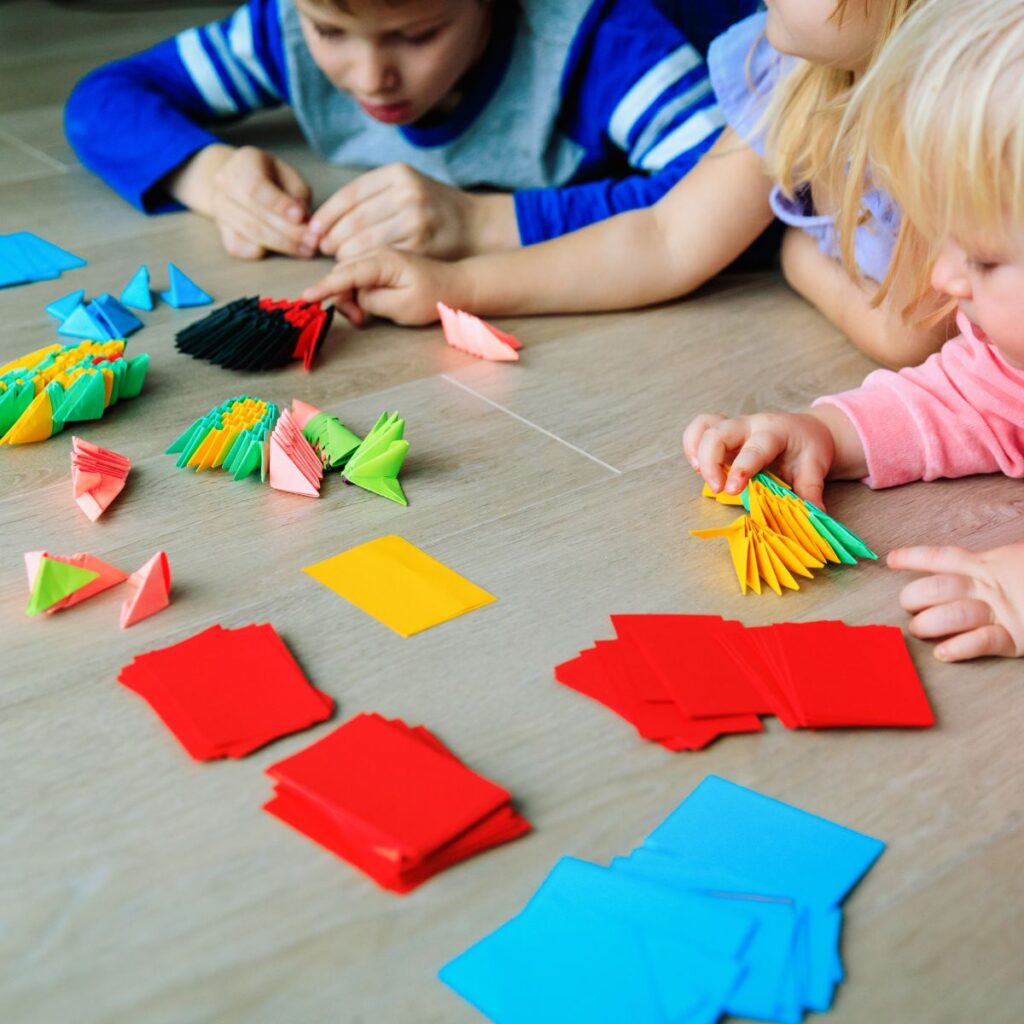
- Sock Puppets: Making and enacting stories with sock puppets fosters creativity and storytelling skills.
- Sorting Laundry: A chore that can teach them sorting and matching.
Intellectual Development for 5 Years Old
- Counting Money: Use pretend money to teach the basic concept of financial literacy.
- Advanced Puzzles: 48-100 pieces puzzles can be a great way to enhance problem-solving skills.
- Reading: At this age, children can start recognizing familiar words and letters. Reading helps boost their language skills.
- Writing: Encourage them to write letters, their name, or even small words. This improves their literacy skills.
- Block Play: Building complex structures with blocks enhances their spatial understanding and creativity.
- Mental Math: Give them small mental math problems to solve, like ‘What is 2+3?’
- Map Reading: Use a simple map of your living room or house to improve their directional skills.
- Measurement Activities: Use a ruler or measuring tape to measure objects around the house. This can help understand the concept of length and height.
- Coding Games: Simple, age-appropriate coding games can stimulate their logical thinking and problem-solving skills.
- Pattern Recognition: Create patterns with blocks, colors, or shapes and ask them to identify and continue the pattern.
- Teach Time: Start with a basic understanding of the clock. This promotes their number recognition and understanding of the concept of time.
- 3D Puzzles: Building 3D structures can boost spatial awareness and problem-solving abilities.
- Science Experiments: Simple experiments can ignite curiosity and provide a basic understanding of scientific principles.
- Journaling: Encourage them to write or draw about their day in a journal. This is a good way to express feelings and enhance literacy skills.
Our favorite journal for young kids
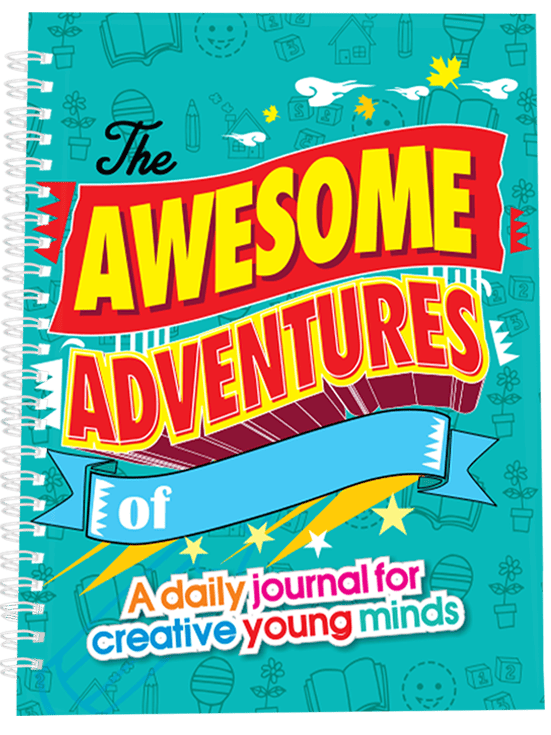
Fun Cognitive Activities in the Classroom
Here are some classroom activities that promotes cognitive development for 3-5 years old.
- Circle Time: This can promote social skills and understanding of emotions of others through group discussions.
- Singing Nursery Rhymes: Nursery rhymes can enhance language skills and memory.
- Free Play: Allow them to choose their own pace and activities. This aids in developing social skills and cognitive function.
- Daily Routine Activities: Incorporate learning into their daily routine like counting chairs or sorting toys.
- Art Projects: Art can help improve creativity and fine motor skills.
- Science Activities: Simple experiments can spark curiosity and promote cognitive abilities.
- Physical Activities: Games like ‘Duck, Duck, Goose’ or ‘Simon Says’ can improve motor skills and social interaction.
- Picture Storybooks: Reading aloud helps them understand new things and broadens their vocabulary.
- Role Play: Engage students in role-playing scenarios to help develop social skills and emotional understanding.
- Storytelling: Encourage them to narrate stories. This boosts imagination and language skills.
- Math Games: Use objects to teach basic math. This is a fun way to learn counting and number recognition.
- Sensory Bins: Fill a bin with different textures and objects. This sensory play promotes exploration and tactile learning.
- Crafts: Making crafts enhances fine motor skills and creativity.
- Coloring Pages: Coloring can improve concentration, fine motor skills, and color recognition.
- Interactive Games: Games like ‘Pass the Parcel’ or ‘Musical Chairs’ can improve social skills and physical activity.
Related : Personal growth mindset kit for children
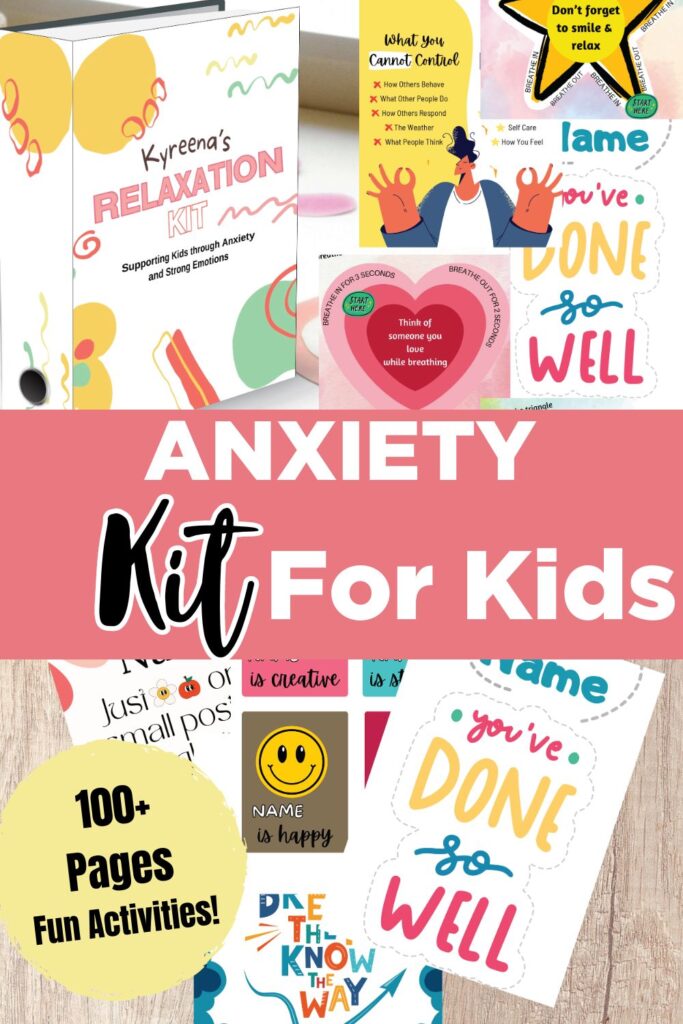
Apps that Promote Cognitive Development for Young Children
- Endless Alphabet: This app introduces kids to new words and letter sounds.
- Lego Tower: A fun app that introduces the concept of planning and structure building.
- Fish School: A colorful app that teaches shapes, numbers, and colors.
- PBS Kids Games: This app has a variety of games based on popular PBS shows that promote learning.
- CodeSpark Academy: An introductory coding app for kids with engaging activities.
- Toca Blocks: This app encourages creative building and problem-solving skills.
- BrainPOP Jr.: This educational app offers learning videos on various topics.
- ABCmouse: This app covers a range of subjects like reading, math, and science.
- Epic!: An online library for kids with thousands of books.
- Quick Math Jr.: A math learning app designed for young children.
Here is a full list of apps suitable for 4 years old including their prices and what your child will learn
Remember, while these apps can be helpful, limiting screen time is essential. Encourage plenty of hands-on play and exploration, as they are the building blocks for cognitive growth in these preschool years.
So, let’s bring back the joy of learning through these fun activities. As Jean Piaget said, “Play is the work of childhood.” So, let them play, explore, and grow!
I hope you enjoyed the cognitive activities for 3-5 years old in this article. Let me know which is your favorite activity in the comment section below.
Was this helpful?
Good job! Please give your positive feedback
How could we improve this post? Please Help us.


